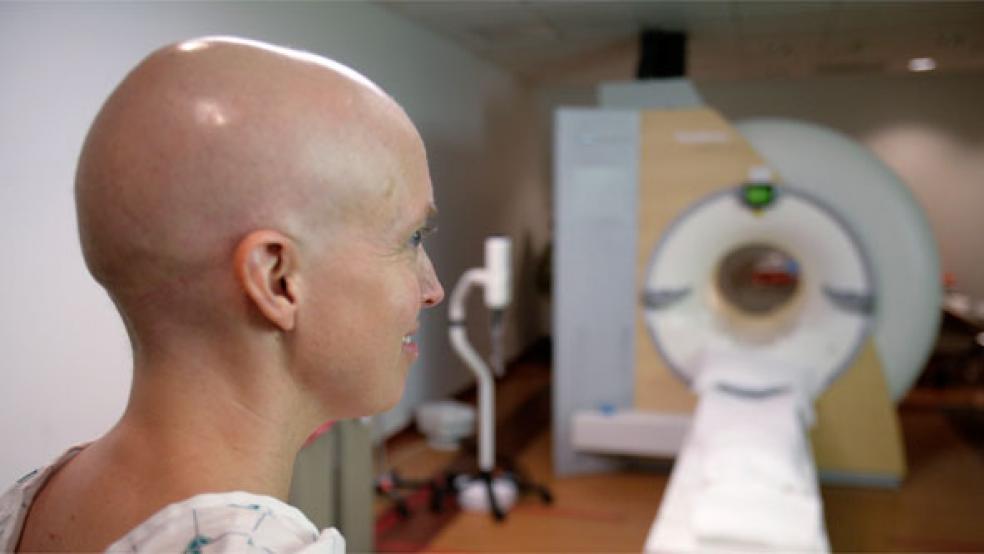Even as scientists have made great strides in the treatment of cancer, the soaring costs of treatments are decimating the savings of cancer survivors, sending many into a downward spiral of bankruptcy, depression and physical decline.
A new study by researchers at the Virginia Commonwealth University in Richmond found that nearly one in three U.S. cancer survivors are confronted with daunting financial burdens, loss of the ability to work, transportation problems and disruptions in their households. And survivors are more likely to incur mental health problems and suffer physical decline.
Related: Obama Administration Will Press Medicare Doctors to Use Cheaper Drugs
The millions of cancer survivors in this country no doubt are grateful for medical advances that have saved their lives, or even simply extended them by a few months. Yet the personal financial implications for many of those survivors – including those with health insurance – often are staggering.
“We found that cancer survivors with three or more financial problems had clinically meaningful differences in their physical and mental health-related quality of life and were two to three times more likely to report depressed mood and six to eight times more likely to worry about cancer recurrence,” Hrishikesh P. Kale, a PhD student in pharmacoeconomics and health outcomes and the lead author of the study, told Reuters.
Moreover, for those who lose their jobs while undergoing extended treatment, that can mean the loss of healthcare insurance as well, further compounding the problem. In many cases, the spouses of cancer victims must take time away from work as well to care for their husbands or wives.
The study, first reported by Reuters, comes at a time when many oncologists and other physicians are complaining about the runaway costs of new prescription drug treatments that are burdening patients and insurers. For example, in 2014 practically every new cancer-treatment drug approved by the Food and Drug Administration was priced at more than $120,000 a year, according to one study. And the cost for each additional year lived by a patient as a result of new drugs increased four-fold -- from $54,000 in 1995 to $207,000 in 2013.
Related: Billion Dollar Drugs: America’s 10 Top Selling Medications
Last July, more than 100 cancer specialists signed an article published by the journal Mayo Clinic Proceedings expressing outrage over the high cost of new cancer drugs. The doctors renewed a call for tough federal regulations to control drug prices. One of their proposals was to change federal law to permit Medicare officials to negotiate with pharmaceutical companies for lower prices and to permit the importation of less expensive drugs from Canada.
High performance specialty drugs for the treatment of cancer typically carry eye-popping price tags: Drugs such as Xofigo for treating late-stage prostate cancer, Cyramza for treating gastric cancer and Zykadia for late-stage lung cancer range in price between $12,600 to $13,672 a month, while Blincyto, treating a rare form of Leukemia, costs as much as $64,260 a month.
Last week, the Obama Administration announced a pilot project that will encourage doctors to use treatments that they say are high quality but less costly by lowering their Medicare reimbursements. The surging cost of biologic drugs for the treatment of cancer, the Hepatitis C virus and other deadly diseases is draining the budgets of Medicare, Medicaid and veterans’ health programs.
The new findings on cost implications for cancer survivors was published in the journal Cancer. They were based on the 2011 Medical Expenditure Panel Survey of 1,380 people who reported being diagnosed with cancer. The survey questions covered a range of financial problems that stemmed from cancer treatment, including going into debt and bankruptcy.
Related: Extreme Rise in Some Drug Prices Reaches a Tipping Point
A dozen of the survey questions also probed the current physical and mental health of the respondents, including whether they ever suffered from depression because of their financial problems.
Among the findings:
- Twenty-nine percent of cancer survivors reported cancer-related financial burdens, including those who have health insurance.
- Eight percent of cancer survivors lacked insurance coverage during the course of their treatment.
- Eight percent of cancer survivors borrowed money, incurred debt or declared bankruptcy.
- One in five said they worried about paying large medical bills.
- Ten percent were unable to cover the cost of medical care visits.
- Major financial problems significantly increased the risk of depression and worry about a recurrence of cancer. People with three or more financial problems had clinically significant worse physical and mental health than other survivors.
- Younger people, women, members of racial or ethnic minorities and those who had short-survival cancers were more likely than others to feel severe financial burden.
The study also isolated the impact of different types of financial problems on the quality of life of cancer survivors. For example, declaring bankruptcy was linked to a 25 percent reduction in quality of life, while fretting about paying large medical bills resulted in a six to eight percent reduction in quality of life.





